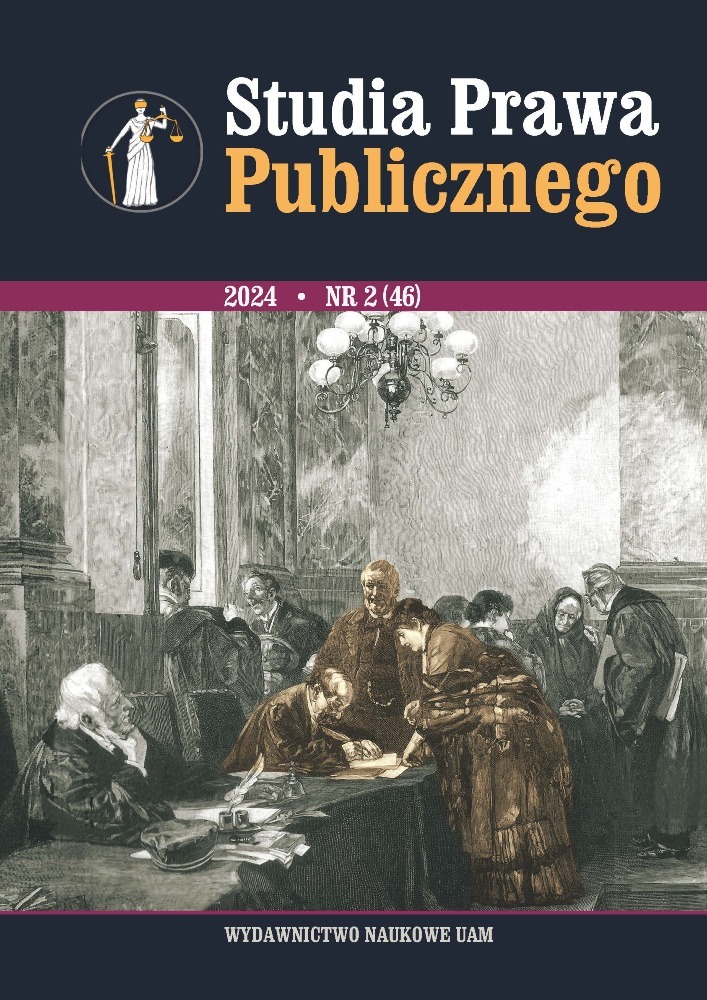Abstract
The authors of the paper undertook an analysis of the regulations on the organization of a poker game under the Gambling Act. The main subject of the analysis revolves around the question to what extent state authorities should monitor and restrict the activity of poker players. The scope of the statutory restrictions on arranging and participating in poker games depends on the culture of perception of gambling in a given country. Assigning poker to the appropriate regulatory category, either as a gambling activity carrying the highest social risks in terms of public health or safety, or as a game primarily for entertainment, is by no means obvious and depends on determining such factors as the purpose of organizing the poker game and the manner in which it is played, i.e. whether players are playing against a casino or against each other. The regulatory differentiation depending on the variety of poker games is the result of years of efforts by national legislators and the jurisprudence to define and categorize the game correctly. The article cites the jurisprudence of the Constitutional Court justifying the formal and material prerequisites of the existing restrictions on the gambling services market. The authors also relied on the extensive body of case law of the Court of Justice of the European Union explicating the permissibility of restrictions on freedom of establishment and freedom to provide services in the sphere of gambling. The conclusions drawn from these reflections confirm that the current provisions of the Polish Gambling Act are part of a consistent and systematic state policy aimed at ensuring the highest possible level of consumer protection, and the introduced restrictions are proportionate and necessary.
References
Frańczuk M., Knurowska I., Poker a zakłady wzajemne – gry hazardowe online po nowelizacji ustawy hazardowej ze szczególnym uwzględnieniem wpływów z opodatkowania, „Krakow Review of Economics and Management / Zeszyty Naukowe Uniwersytetu Ekonomicznego w Krakowie” 2013, nr 919, s. 19–32.
Grusza J., Znowelizowana ustawa o grach hazardowych w świetle prawa Unii Europejskiej, „Zeszyty Naukowe Uniwersytetu Rzeszowskiego. Seria Prawnicza” 2018, nr 23(102), s. 132–146. DOI: https://doi.org/10.15584/znurprawo.2018.23.10
Hunter A., Griffiths M.D., What Differentiates Professional Poker Players from Recreational Poker Players? A Qualitative Interview Study, „International Journal of Mental Health and Addiction” 2012, nr 10(2), s. 243–257. DOI: https://doi.org/10.1007/s11469-011-9312-y
Kaleta K., Wiącek M., Wolności, prawa i obowiązki człowieka i obywatela, w: Konstytucja III RP w tezach orzeczniczych Trybunału Konstytucyjnego i wybranych sądów, pod red. M. Zubika, Warszawa 2008, s. 79–266.
Lewandowicz M., E-hazard. Studium z komparatystyki prawniczej, Warszawa 2013.
Lewandowicz M., Wybrane aspekty nowelizacji ustawy o grach hazardowych w świetle prawa unijnego, „Europejski Przegląd Sądowy” 2017, nr 8, s. 14–21.
Łacny J., Gry hazardowe w Internecie – ustępstwo wobec swobód rynku wewnętrznego?, „Europejski Przegląd Sądowy” 2012, nr 1, s. 15–21.
Scheuring K., Ochrona praw jednostek w postępowaniach przed sądami wspólnotowymi, Warszawa 2007.
Skowronek G., Prawne aspekty hazardu, Wrocław 2012.
Skrzydło-Tefelska E., Nowe wyroki TS w sprawie organizacji gier hazardowych (cz. II), „Europejski Przegląd Sądowy” 2013, nr 2, s. 36–42.
Stawowy M., Organizacja turnieju gry w pokera. Uwagi po nowelizacji przepisów ustawy o grach hazardowych, „Przegląd Prawa Publicznego” 2018, nr 7–8, s. 151–158.
Taborowski M., Od Redaktora, w: Skutki braku notyfikacji przepisów technicznych ustawy o grach hazardowych dla wymiaru sprawiedliwości Rzeczpospolitej Polskiej, pod red. M. Taborowskiego, Warszawa 2016, s. 15.
Zawidzka-Łojek A., Zróżnicowanie obszarów wrażliwych. Test proporcjonalności w orzecznictwie Trybunału Sprawiedliwości Unii Europejskiej dotyczącym hazardu, w: Skutki braku notyfikacji przepisów technicznych ustawy o grach hazardowych dla wymiaru sprawiedliwości Rzeczypospolitej Polskiej, pod red. M. Taborowskiego, s. 470–471.
License
Copyright (c) 2024 Maria Lewandowicz, Marek Kacprzak

This work is licensed under a Creative Commons Attribution-NoDerivatives 4.0 International License.

